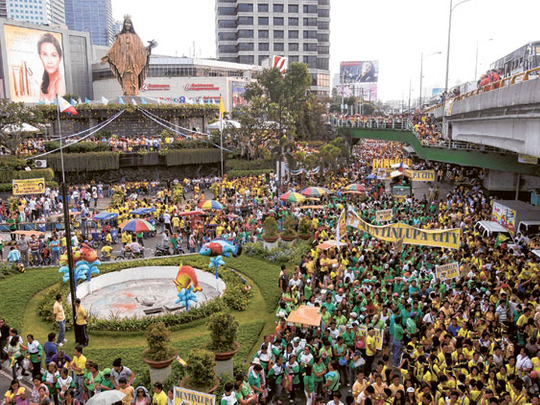
Manila: Philippine President Benigno Aquino has revealed that he wanted to seek revenge after the assassination of his father, former Senator Benigno Aquino.
Aquino was killed by military escorts of former President Ferdinand Marcos as he was brought down from a service staircase of a China Airlines flight at the Manila International Airport on August 21, 1983.
“As the only son, I felt an overwhelming urge to exact an eye for an eye (against the Marcos administration),” President Aquino said during a speech before members of the Filipino community in Boston, the transcript of which reached Malacanang, Manila’s presidential palace.
“I knew that he was a formidable foe, and the fight would be impossible, but regardless of this, in those moments, all I wanted to do to Mr Marcos and his camp, was to do unto him as he had done unto us,” President Aquino said.
Rabid dogs
Assessing the era when Marcos established Martial law in 1972, after which former Senator Aquino was arrested in 1973, President Aquino said the former dictator’s allies were like “rabid dogs who had lost all reason”.
The government’s initial version of the killing claimed that Aquino was shot on the tarmac by a lone gunman called Rolando Galman, an alleged leftist who managed to enter a heavily guarded runway where the China Airlines plane had landed.
The incident sparked a wave of anti-Marcos protests from the middle class, which were capped by a people-backed military mutiny that paved the way for the ouster of Marcos and the ascent of Mrs Corazon Aquino to the presidency in February 1986.
The “People Power Revolution” occurred a month after Marcos was forced to call for snap elections in which he and Mrs Aquino fought for the presidency in late 1985.
During her term as president, Mrs Aquino always blamed Marcos as the alleged mastermind in the killing of her husband.
A retrial resulted in the conviction of more than 16 security men who guarded the plane that brought in Senator Aquino, for the assassination.
Marcos died in 1989 after three years of living in exile in Honolulu, Hawaii. His surviving family members were allowed to return to the Philippines in 1991. And his remains were allowed to return to his hometown in Ilocos, northern Luzon in 1992, after the election of President Fidel Ramos in the same year.
State burial
Since then, the Marcos family failed in their request for a state burial for the remains of the former strongman at Manila’s National Heroes Park.
President Aquino remained firm that the request of the Marcos family would not be granted despite the alliance of the ruling Liberal Party that he heads and the Nationalista Party which had adopted Senator Ferdinand Marcos Jr — son of former President Marcos — as a member, when he ran for a Senate seat in 2010.
Aquino’s statement in Boston sparked the debate anew.
Aquino’s ally and buddy, Senator Francis Escudero, whose father former Congressman Salvador Escudero served as Marcos’ agriculture secretary, said the two political families must mend ties.
“That’s his decision. But for me, it is time to consider the healing of political wounds [between the two rival families], and to stop the opening of all other festering political wounds in this country so that we could move on,” said Senator Escudero.
In 2011, Congressman Escudero managed to get more than 190 signatories for a house resolution that called for the granting of a state burial for Marcos.
Militant sectoral parties at the House of Representatives opposed the resolution, in deference to the victims of rights violations during the Martial law era.
At the time, President Aquino rejected the Marcos family’s request, insisting it would not granted under his watch.
He also asked Vice-President Jejomar Binay to handle the issue.
In response, Binay suggested a state burial for the remains of Marcos in his hometown in Ilocos Norte.
The family has kept the Marcos remains in a refrigerated crypt in a family-owned mausoleum which has become a tourist attraction in the northern region.












